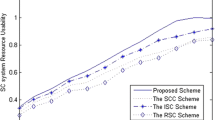Abstract
With the collaboration of several intelligent services, a crowd intelligence service network has been formed, and a service ecosystem has gradually emerged. As a novel service organization model, the Service Ecosystem (SE) can provide more sophisticated, precise, and thorough services and has attracted widespread attention. However, it also brings negative effects such as involution, and information cocoon room. Thus, how to analyze the collaborative decision-making mechanism between the SE regulation algorithm and the crowd intelligence group, exploring the reasons behind the negative effects, and finding effective intervention strategies have become problems in this field. To solve the challenges, we propose a Computational Experiments-based method Decision-making processes Analysis model in SE, namely CEDA. The proposed CEDA model consists of three modules: the autonomous evolution mechanism module, the learning evolution mechanism module, and the collaborative decision-making analysis module. Among them, the computational experiments can provide a customized test environment for the analysis of collaborative decision-making processes and find out the appropriate intervention strategy. Finally, the validity of the CEDA model is verified through the case of academic ecosystem involution. The results show that computational experiments can provide new ideas and paths for collaborative decision-making processes analysis.
Access this chapter
Tax calculation will be finalised at checkout
Purchases are for personal use only
Similar content being viewed by others
References
Xue, X., et al.: Research roadmap of service ecosystems: a crowd intelligence perspective. Int. J. Crowd Sci. 6, 28 (2022)
Kang, H., Lou, C.: AI agency vs. human agency: understanding human–AI interactions on TikTok and their implications for user engagement. J. Comput.-Mediated Commun. 27, zmac014 (2022)
Gal, U., Jensen, T.B., Stein, M.-K.: Breaking the vicious cycle of algorithmic management: a virtue ethics approach to people analytics. Inf. Organ. 30(2), 100301 (2020)
Chen, J., Wang, L., Wang, S., Wang, X., Ren, H.: An effective matching algorithm with adaptive tie-breaking strategy for online food delivery problem. Complex Intell. Syst., 107–128 (2022)
Geertz, C.: Agricultural Involution. University of California Press (2020)
Bruns, A.: Filter bubble. Internet Policy Rev. (2019)
Miikkulainen, R., et al.: Sentient ascend: AI-based massively multivariate conversion rate optimization. In: AAAI, vol. 32 (2018)
Shi, J.-C., Yu, Y., Da, Q., Chen, S.-Y., Zeng, A.-X.: Virtual-Taobao: virtualizing real-world online retail environment for reinforcement learning. In: AAAI, vol. 33, pp. 4902–4909 (2019)
Duderstadt, V.H., Mojzisch, A., Germar, M.: Social norm learning from non-human agents can induce a persistent perceptual bias: a diffusion model approach. Acta Physiol. 229, 103691 (2022)
Koster, R., et al.: Human-centered mechanism design with democratic AI. Nat. Hum. Behav. 6(10), 1398–1407 (2022)
Xue, X., Chen, F.Y., Zhou, D., Wang, X., Lu, M., Wang, F.Y.: Computational experiments for complex social systems Part I: the customization of computational model. IEEE Trans. Comput. Soc. Syst. 9(5), 1330–1344 (2022)
Lu, M., Chen, S., Xue, X., Wang, X., Zhang, Y., Wang, F.Y.: Computational experiments for complex social system Part II: the evaluation of computational model. IEEE Trans. Comput. Soc. Syst. 9(4), 1224–1236 (2022)
Xue, X., Yu, X.N., Zhou, D.Y., Peng, C., Wang, X., Wang, F.Y.: Computational experiments for complex social systems, Part III: the docking of domain models. IEEE Trans. Comput. Soc. Syst. (2023)
Xue, X., Yu, X.N., Zhou, D.Y., Peng, C., Wang, X., Wang, F.Y.: Computational experiments: past, present and perspective. Acta Automatica Sinica 49(2), 1–26 (2023)
Bucher, T.: The algorithmic imaginary: exploring the ordinary affects of Facebook algorithms. Inf. Commun. Soc. 20, 30–44 (2017)
Alvarado, O., Waern, A.: Towards algorithmic experience: initial efforts for social media contexts. In: Proceedings of the 2018 CHI Conference on Human Factors in Computing Systems, pp. 1–12. ACM, Montreal, QC, Canada (2018)
Shin, D., Zhong, B., Biocca, F.A.: Beyond user experience: what constitutes algorithmic experiences? Int. J. Inf. Manage. 52, 102061 (2020)
Li, X., Sung, Y.: Anthropomorphism brings us closer: the mediating role of psychological distance in user–AI assistant interactions. Comput. Hum. Behav. 118, 106680 (2021)
Xue, X., Wang, S., Zhang, L., Feng, Z., Guo, Y.: Social learning evolution (SLE): computational experiment-based modeling framework of social manufacturing. IEEE Trans. Ind. Inf. 15, 3343–3355 (2019)
Woolston, C.: Satisfaction in science. Nature, 611–615 (2018)
Acknowledgment
This work has been supported in part by National Key Research and Development Program of China (No. 2021YFF0900800), National Natural Science Foundation of China (No. 61972276, No. 62206116, No. 62032016), New Liberal Arts Reform and Practice Project of National Ministry of Education (No. 2021170002), Open Research Fund of The State Key Laboratory for Management and Control of Complex Systems (No. 20210101), Tianjin University Talent Innovation Reward Program for Literature & Science Graduate Student (C1-2022-010).
Author information
Authors and Affiliations
Corresponding author
Editor information
Editors and Affiliations
Rights and permissions
Copyright information
© 2024 ICST Institute for Computer Sciences, Social Informatics and Telecommunications Engineering
About this paper
Cite this paper
Yan, X., Xue, X., Peng, C., Liu, D., Feng, Z., Xiao, W. (2024). Collaborative Decision-Making Processes Analysis of Service Ecosystem: A Case Study of Academic Ecosystem Involution. In: Gao, H., Wang, X., Voros, N. (eds) Collaborative Computing: Networking, Applications and Worksharing. CollaborateCom 2023. Lecture Notes of the Institute for Computer Sciences, Social Informatics and Telecommunications Engineering, vol 563. Springer, Cham. https://doi.org/10.1007/978-3-031-54531-3_12
Download citation
DOI: https://doi.org/10.1007/978-3-031-54531-3_12
Published:
Publisher Name: Springer, Cham
Print ISBN: 978-3-031-54530-6
Online ISBN: 978-3-031-54531-3
eBook Packages: Computer ScienceComputer Science (R0)




